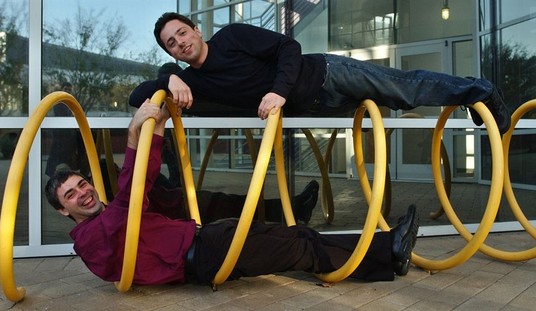Aaron Sorkin has built a reputation for turning politics into entertainment — and entertainment into politics. In movies such as The American President and The Social Network, and in TV shows like The West Wing and Sports Night, Sorkin has leveraged clever dialogue and his progressive world view into ratings and critical success. This year, Sorkin’s trying to do the same on HBO by merging cable news and politics into entertainment, which … er … is exactly what MSNBC, Fox, and CNN do every day. Newsroom makes its debut this month, but the people who actually live and work in newsrooms are less than impressed.
Earlier this week, the Washington Post’s Hank Stuever blasted the show as “crammed with incessant gibber-jabber” in service to Sorkin’s political hobby horses:
Characters never stop speechifying to one another, replacing believable dialogue with that unmistakably Sorkinesque logorrhea of righteous self-importance. It’s a puppet show with Sorkin as the only hand, expressing his displeasure with the tenor of public discourse. (Which everyone knows has reached an unctuous low.) “The Newsroom” is principally concerned with how American society has been ruined by the blaring insipidity of our 24-7 media culture. The theme song swells with a collage of images of the founding fathers of television news, but if Edward R. Murrow is watching, I suspect he’s chuckling in his grave rather than spinning in it. (Fun fact: Murrow was cremated.) …
A twist for Sorkin (but not for viewers), is that Will is a Republican who has taken it upon himself to challenge the party’s rightward fringe, providing a novel new way to present a Democratic fantasia. “I’m a registered Republican,” Will says in a prime example of elegant Sorkinese. “I only seem liberal because I believe hurricanes are caused by high barometric pressure and not by gay marriage.” Real events from 2010 and 2011 — including the BP oil spill, the midterm election that ushered tea partiers into Congress and the Gabrielle Giffords shooting in Tucson — form the backdrop of Will’s newly located outrage. His pulpit gets a nightly workout on air and a constant workout everywhere else.
The word pile that once seemed so melodious in Sorkin’s other projects — especially that millennial anti-anxiety medication known as the “The West Wing” — now has the effect of tinnitus. The men talk like Sorkin writes; the women talk that way, too; the 28-year-olds talk like that, as do the 41-year-olds, as do the cast’s septuagenarians, who include Sam Waterston as the head of the network news division and, later on, Jane Fonda as the network owner who puts the arch in matriarch. (In other words, Jane Fonda as Ted Turner.)
At one point in the first episode, MacKenzie delivers not one, not two but three grandiloquent monologues to Will, one right after the other. Sorkin’s writing lapses into self-parody, leaving savvier viewers to marvel at how quickly the show goes awry. And anyhow, HBO already has a compelling series in which whip-smart people of various political persuasions gather to out-argue one another and bemoan the state of media ignorance. It’s called “Real Time With Bill Maher.”
How about journalists who work both in the field and in actual TV newsrooms? ABC’s Jake Tapper really, really wanted to like the show, he writes for The New Republic, but had to keep resisting the urge to change the channel — and he was watching it on DVDs:
I wanted this show to be great. When asked to participate in a conference call, gratis, where I shared some of my reporting experiences with the writers, I eagerly did so. But I won’t further bury the lede: “The Newsroom,” which debuts June 24 on HBO, is sadly disappointing. There’s much to criticize in the media—and TV news in particular. But though “The Newsroom” intends to lecture its viewers on the higher virtues of capital-J journalism, Professor Sorkin soon reveals he isn’t much of an expert on the subject. …
But that prompts the question: protect it from what? This is where Sorkin’s high-minded critique falls flat. McAvoy sanctimoniously laments the deterioration of public discourse and the news media’s complicity in it. But if that is the problem, his subsequent actions reveal a commitment to a uniformly partisan solution. McAvoy—and, by extension, Sorkin—preach political selflessness, but they practice pure partisanship; they extol the Fourth Estate’s democratic duty, but they believe that responsibility consists mostly of criticizing Republicans. This is done through the oldest trick in the book for a Hollywood liberal: by having McAvoy be a “sane Republican” who looks at his party with sadness and anger.
Hey, there’s a show for that, too. It’s called Morning Joe.
In another episode Sorkin pats McAvoy on the back for limiting his coverage of the failed Times Square bomber and resisting the temptation to “hype” a terrorist threat that fizzled. (With no apparent sense of sarcasm, Skinner repeats praise for their restraint from Media Matters and Think Progress, as if those explicitly liberal websites are nonideological arbiters of Edward R. Murrow’s legacy.) And what are the important issues “News Night” covers instead of the piffle of Faisal Shahzad, a homegrown terrorist funded and trained by the Pakistani Taliban? McAvoy instead devotes at least a week of his broadcast to showcasing what a horribly inept and dangerous bunch Tea Party Republicans are as they—gasp!—defeat establishment Republicans in free and fair primaries and elections. It’s all well and good to follow the Koch brothers’ money, but at a time when Democrats controlled the White House and both houses of Congress, it’s telling that McAvoy and Sorkin aim their sights at conservatives seeking power—not moderates and liberals wielding it.
It’s telling, of course, and it’s also entirely predictable. I doubt that at this stage anyone would have different expectations of a Sorkin production, but that prompts the question of why anyone to the right of Tom Harkin would bother watching it.
Howard Kurtz, who also knows a few things about newsrooms and journalism, is equally unimpressed:
Maybe expectations were too high, given the brilliance of Sorkin’s track record (The West Wing, The Social Network). Maybe, after reading that Sorkin was hanging out with Keith Olbermann, we were looking for a brilliantly nuanced rendition of the pathologies of cable news.
The thing is, as the individual soap operas unfold, the characters at times seem rather cartoonish. The thing is, for much of the episode that debuts Sunday night, they could work in a law office, since the plot turns on their clashing egos, romantic urges, and overweening personalities. …
Forgive me if this is less than inspiring. But then, Sorkin isn’t really interested in unspooling how journalism functions, the way he was in how Martin Sheen wielded political power. The bustle of the newsroom is a mere backdrop for self-involved characters to give talky speeches and taunt each other. In fact, the smart-ass speeches go on and on and on, the actors seemingly in love with the sound of their voices.
Now that sounds like a Sorkin production. It’s yet another iteration of a progressive passion play about how awful conservatives are, and how principled and yet oddly conflicted progressives are in attempting to lead the benighted Right into the nirvana of central planning. In other contexts, the media might have loved that kind of psychodrama, but Sorkin may have miscalculated by transplanting his oeuvre into a place they understand better than he does.








Join the conversation as a VIP Member